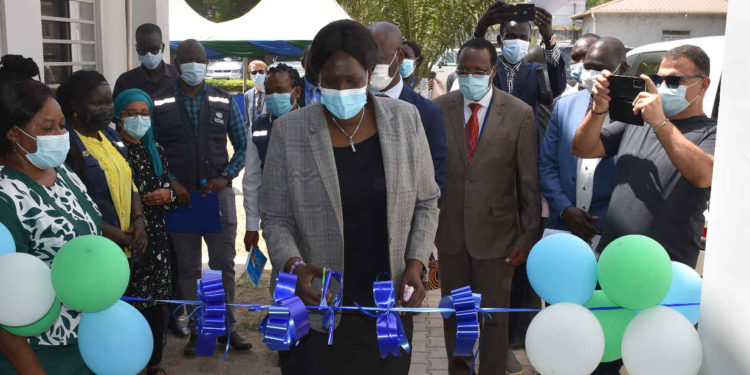The center is part of a $4.2 million African Development Bank grant-financed Covid-19 response project that included procuring an oxygen plant, vehicles, a wide range of essential medicines, lifesaving biomedical equipment and personal protective equipment. The World Health Organization (WHO) implemented the project.
African Development Bank Country Manager for South Sudan Themba Bhebhe and Dr Fabian Ndenzako, WHO South Sudan Representative a.i., handed over the facility to Health Minister Elizabeth Achuei Yol, at a ceremony attended by senior health ministry officials, development partners, WHO South Sudan staff and journalists.
During phase two, the Center was equipped with hardware and software to facilitate emergency response operations.
“The African Development Bank and WHO have played a crucial role in strengthening our capacity to reduce, mitigate and manage the adverse impacts of Covid-19,” said Dr Victoria Anib, the Undersecretary, Ministry of Health. “I would like to thank [them] for enhancing national health security and supporting us in the fight against Covid-19 and request them to continue doing so going forward.”
South Sudan continues to experience recurrent epidemic-prone diseases, and other public health and humanitarian emergencies. The emergency center is a critical component of detecting and controlling any potential outbreak and serves as the strategic coordination center for health emergencies, including the Covid-19 response.
Bhebhe, the African Development Bank’s representative in South Sudan, said public health emergencies arising from public health threats continued to be a major concern in African countries. He noted that South Sudan was particularly at risk, given the characteristic fragility of its health architecture.
“The handing over of South Sudan’s functional public health emergency operations center is a watershed in the African Development Bank’s growing efforts to help the country fulfill obligations required by international health regulations. The facility is a critical building block in helping South Sudan prepare for and respond to public health emergencies in terms of coordinating the preparation for, response to, and recovery from public health emergencies,” Bhebhe said.
READ MORE: Equatorial Guinea: Dreams Hub Begins Coding Classes for children under 13
In agreement, WHO’s Dr Ndenzako described the establishment of the second phase of the Public Health Emergency Operations Center as “a key milestone in line with compliance with the International Health Regulations (2005) to strengthen communication and coordination for effective public health response.”
Source: AfDB









